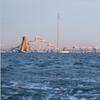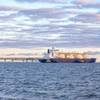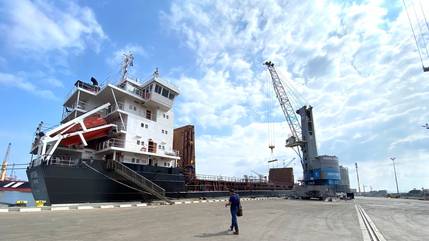China's Seizure of Japanese Ship has Pre-WWII Roots
It all began with a pre-World War II contract between China's then "ship king" and a Japanese company to lease two Chinese freighters.
When the one-year lease was up in 1937, the ships were nowhere to be found. That year also marked the start of a full-scale war between China and Japan.
And so began a protracted legal case which came to a head last weekend, when a Chinese court ordered the seizure of an iron ore carrier owned by the successor to the original Japanese company in compensation for the loss of the two Chinese vessels.
The impoundment has created unease in Japan's government, which warns that the action could affect Japanese businesses in China. It remains unclear whether the sudden ruling by the Shanghai Maritime Court would herald the seizure of more Japanese assets.
While the Chinese government describes the case as a simple business dispute and that it has nothing to do with wartime compensation, the court's verdict has become a cause célèbre for activists in China fighting for what they see as much-delayed financial compensation from Japan for its wartime deeds.
Tong Zeng, a veteran Chinese activist who has been leading the charge for wartime compensation from Japan, said there were at least 10 other cases either in courts or going to be lodged, with many others expected down the line.
"This is just the beginning," Tong, who has helped advise the plaintiffs in the ship case, told Reuters on Tuesday.
In February, a case was lodged in Beijing by a group of 37 people, including lawyers and academics as well as forced labourers and their families, demanding compensation for Chinese citizens made by the Japanese to work as forced labourers during World War Two.
"There is the Beijing case, and now this seizure - certainly many victims will take up legal weapons," said Tong, who oversees the Chinese Federation of Demanding Compensation From Japan.
The Shanghai court on Saturday seized a ship owned by Japanese shipping firm Mitsui O.S.K. Lines (MOL), saying the company had failed to pay compensation stemming from a wartime contractual obligation.
The details - including why the court chose to announce the seizure at this time of heightened tensions with Japan - remain murky.
In the late 1980s, Chen Zhen and Chen Chun brought a lawsuit against the company which later became MOL. The two descendents of Chen Shuntong, who owned Chung Wei Steamship Co, were among other plaintiffs seeking financial compensation in a Shanghai court for the loss of the two vessels.
One of the ships hit a reef and sank in 1938 while another was destroyed by a mine in 1944, according to state news agency Xinhua.
Since the 1980s, one of Chens has died, and Tong said he is no longer able to find the original court documents he had about the case.
Reuters has been unable to reach the plaintiffs or their lawyer for comment. Tong said they are not currently accepting media interviews.
The Shanghai court, in its short statement, also gave no clear explanation for why now, after all these years, it ordered the ship seized. It simply said mediation between the two parties had failed, and so the seizure order was issued.
Tong said the plaintiffs had been pushing for the seizure for a while, and that the Japanese side had thrown up all sorts of legal objections which had finally been exhausted.
MOL said it was seeking the possibility of out-of-court settlement when it was notified that its ship was impounded.
"It's a legal fact (what has happened), and it just happens to have happened while we are in this environment," Tong added, referring to the current poor relations between Beijing and Tokyo.
Poisoned Ties
China's ties with Japan have long been poisoned by what Beijing sees as Japan's failure to atone for its occupation of parts of China before and during World War Two. Japan, for its part, has looked on warily as China strengthens its military.
Dozens of wartime compensation suits have been filed previously in Japan against the Japanese government and companies associated with its aggression in the first half of the 20th century, including World War Two. Almost all have been rejected by Japanese courts.
The Japanese government insists that the issue of war reparations was settled by the 1951 San Francisco Peace Treaty, which formally ended the war, and by later bilateral treaties.
It says all wartime compensation issues concerning China were settled by a 1972 joint statement establishing diplomatic ties.
Some Chinese legal experts point to cases involving Germany after World War Two as setting a precedent in China now.
"Around 2007, Greece and Italy both handled forced war labour in Germany cases for Greek and Italian citizens, and issued judgements on their home soil," said Pan Guoping, a professor of international law at Southwest University of Political Science and Law in Chongqing.
"In international law, the government represents the actions of the government or state, but that is separate from cases involving the assets of individuals."
Xinhua said the case first went to court in 1989, dragging on for more than two decades due to its complexity and the fact that it happened so long ago.
MOL Unfazed
MOL has about 10 bulkers calling at China in the next month, said Toshiaki Tanaka, general manager of MOL's iron ore carrier division, though he did not expect further ship seizures.
"There is only one case in dispute," he said, adding that he did not think it would affect MOL's business in China.
The iron ore carrier, Baosteel Emotion, is on a long-term contract between Baoshan Iron & Steel Co Ltd and MOL, transporting iron ore from Western Australia to steel mill in Shanghai. MOL also regularly transports cargo for iron ore miners including Vale SA and BHP Billiton Ltd , Tanaka said.
"We have not had any comment from them," following the seizure of the Baosteel Emotion, Takanaka said.
MOL operates daily container shipping services at Chinese ports and is an investor in China's burgeoning liquefied natural gas sector. MOL is a co-owner in 10 LNG carriers being built in China to transport the fuel from the ExxonMobil project in Papua New Guinea and Australia Pacific LNG to China.
Tong said the family who owned the two ships had tried suing for compensation in Japan in the 1950s and 1960s, but failed.
He added that he expected MOL to pay up to get their ship released.
"If they don't pay up ... then the ship can be auctioned off," Tong said.
Deteriorating Sino-Japan relations have been fuelled by a row over a chain of uninhabited islands in the East China Sea.
Ties have worsened since China's creation of an air defence identification zone over the East China Sea and Japanese Prime Minister Shinzo Abe's December visit to the controversial Yasukuni Shrine honouring war criminals among Japan's war dead.
(By Li Hui and Ben Blanchard; Additional reporting by Keith Wallis; Editing by Ryan Woo)












